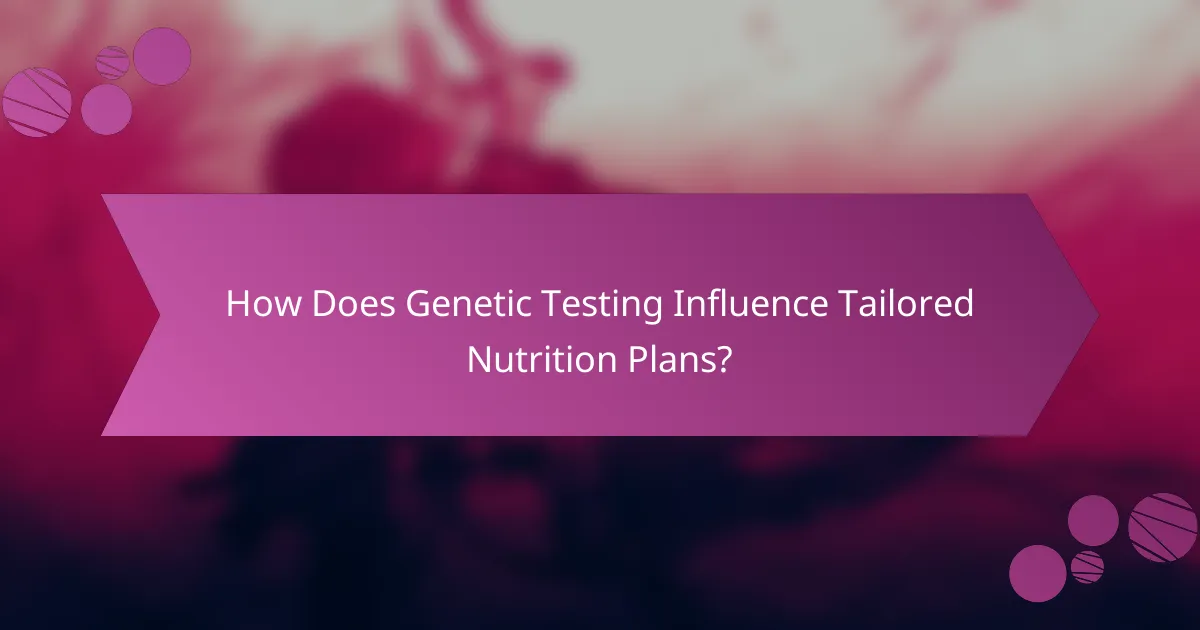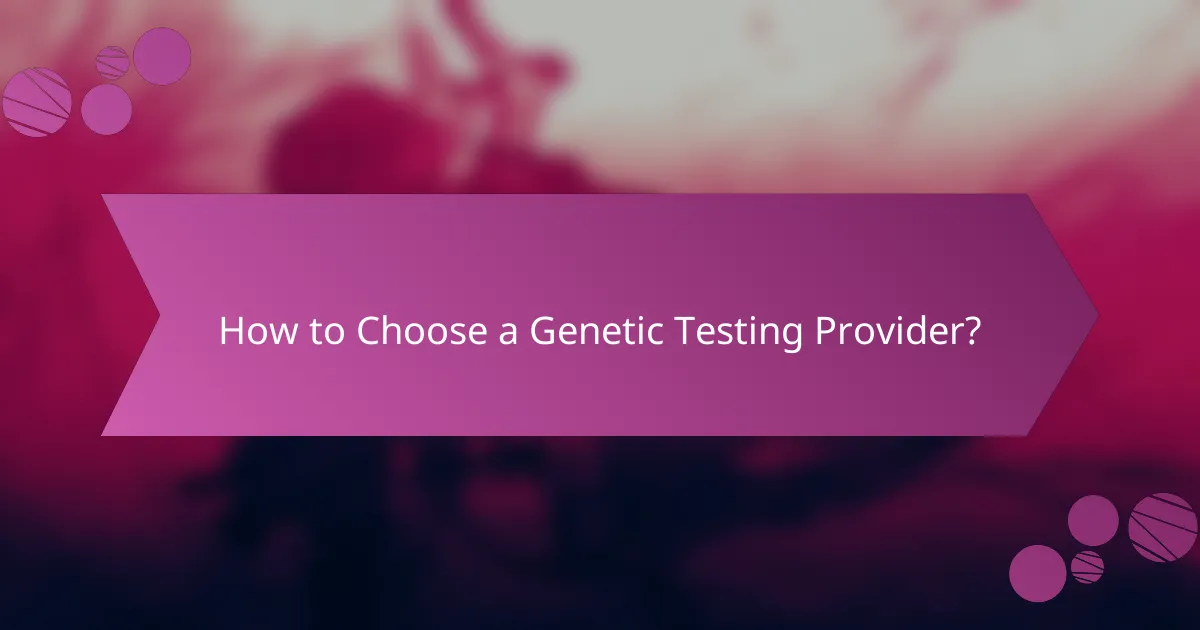Genetic testing plays a crucial role in developing tailored nutrition plans by revealing insights into an individual’s unique genetic makeup. By analyzing genetic markers, these tests enable the creation of personalized dietary strategies that align with specific nutritional needs and health goals, ultimately enhancing overall well-being.

How Does Genetic Testing Influence Tailored Nutrition Plans?
Genetic testing can significantly enhance tailored nutrition plans by providing insights into an individual’s unique genetic makeup. This information helps in crafting personalized dietary strategies that align with specific nutritional needs and health goals.
Personalized dietary recommendations
Genetic testing allows nutritionists to create personalized dietary recommendations based on an individual’s genetic profile. For example, some people may metabolize carbohydrates differently, indicating a need for a lower-carb diet, while others may benefit from higher protein intake. These tailored suggestions can lead to more effective weight management and improved overall health.
To implement personalized dietary recommendations, individuals should consult with a registered dietitian who specializes in genetic nutrition. This professional can interpret genetic results and develop a practical meal plan that fits personal preferences and lifestyle.
Identification of nutrient deficiencies
Through genetic testing, specific nutrient deficiencies can be identified, allowing for targeted dietary adjustments. For instance, individuals with genetic variants affecting vitamin D metabolism may require higher dietary intake or supplementation of this nutrient. Recognizing these deficiencies early can prevent long-term health issues.
To address potential deficiencies, individuals should regularly monitor their nutrient levels and consult healthcare providers for appropriate testing and supplementation strategies. This proactive approach can enhance overall well-being and support optimal health outcomes.
Customization based on genetic predispositions
Genetic predispositions can influence how individuals respond to certain foods and nutrients, making customization essential. For example, some people may have a genetic tendency towards lactose intolerance, necessitating the avoidance of dairy products or the choice of lactose-free alternatives. Understanding these predispositions helps in making informed dietary choices.
When customizing nutrition plans, consider factors such as family history and specific genetic markers. This information can guide food selections and meal timing, ultimately leading to better health management and disease prevention.

What Are the Benefits of Tailored Nutrition Plans?
Tailored nutrition plans offer personalized dietary strategies that align with individual genetic profiles, leading to significant health improvements. By focusing on specific needs, these plans can enhance overall well-being and support various health goals.
Improved health outcomes
Tailored nutrition plans can lead to better health outcomes by addressing specific dietary needs based on genetic predispositions. For instance, individuals with a genetic tendency towards high cholesterol may benefit from a diet rich in omega-3 fatty acids and fiber.
Moreover, personalized plans can help manage chronic conditions such as diabetes or hypertension by recommending foods that stabilize blood sugar levels or lower blood pressure. Regular monitoring and adjustments can further enhance these benefits.
Enhanced weight management
Customized nutrition plans can significantly improve weight management by aligning dietary choices with metabolic rates and genetic factors. For example, individuals with a genetic predisposition to gain weight may find success with a lower carbohydrate intake.
Additionally, tailored plans can help identify food sensitivities that may hinder weight loss efforts. By focusing on whole, nutrient-dense foods, individuals can achieve sustainable weight loss while maintaining energy levels.
Increased energy levels
Personalized nutrition can boost energy levels by ensuring that individuals consume the right balance of macronutrients. For instance, a diet rich in complex carbohydrates, healthy fats, and proteins can provide sustained energy throughout the day.
Furthermore, tailored plans can help avoid energy crashes often associated with processed foods. Incorporating foods that align with one’s genetic profile can enhance nutrient absorption, leading to improved vitality and overall performance.

Which Genetic Testing Services Are Available?
Several genetic testing services provide insights into your DNA, helping to inform tailored nutrition plans. These services analyze genetic markers to offer personalized recommendations based on your unique genetic profile.
23andMe
23andMe is a popular genetic testing service that offers insights into ancestry and health traits. Their health reports include information on how your genetics may influence your response to certain diets, exercise, and nutrient absorption.
When using 23andMe, consider that their reports are based on genetic variants associated with various traits, but they do not provide medical advice. Users should interpret results as part of a broader health and nutrition strategy.
AncestryDNA
AncestryDNA primarily focuses on ancestry but also provides health-related insights. While it does not offer as detailed nutritional guidance as some competitors, it can help users understand their genetic predispositions that may affect dietary needs.
For those interested in ancestry and its potential impact on nutrition, AncestryDNA can be a valuable resource. However, users should supplement these insights with additional nutritional advice tailored to their specific health goals.
Nutrafol
Nutrafol specializes in hair health and wellness, offering genetic testing to identify factors influencing hair growth and loss. Their service provides personalized supplement recommendations based on genetic insights.
When considering Nutrafol, keep in mind that their focus is on hair health rather than comprehensive nutritional plans. Users should integrate Nutrafol’s recommendations with broader dietary strategies to support overall wellness.

How to Choose a Genetic Testing Provider?
Choosing a genetic testing provider involves evaluating their reputation, the types of tests they offer, and their pricing structure. Prioritize providers that align with your specific health goals and needs.
Reputation and reviews
Start by researching the provider’s reputation through online reviews and testimonials. Look for feedback on their accuracy, customer service, and the overall experience of previous clients.
Check if the provider is accredited by relevant organizations, which can indicate adherence to quality standards. Websites like the Better Business Bureau or health-related forums can provide insights into their credibility.
Types of tests offered
Different genetic testing providers may offer various tests, such as ancestry analysis, health risk assessments, or personalized nutrition plans. Determine which type of testing aligns with your goals.
Some providers focus on specific areas like fitness or diet, while others may offer a broader range of health-related insights. Review the details of each test to ensure it meets your needs.
Cost and insurance coverage
The cost of genetic testing can vary significantly, typically ranging from a few hundred to over a thousand USD. Check if the provider offers payment plans or discounts for multiple tests.
Insurance coverage for genetic testing can be inconsistent. Contact your insurance company to inquire about coverage options and whether the provider is in-network, which can help reduce out-of-pocket expenses.

What Are the Limitations of Genetic Testing for Nutrition?
Genetic testing for nutrition has several limitations that can impact its effectiveness. While it can provide insights into how genes may influence dietary needs, inaccuracies and ethical concerns can limit its practical application.
Potential inaccuracies
Genetic tests can yield inaccurate results due to various factors, including the quality of the sample and the algorithms used for analysis. For instance, different laboratories may interpret genetic markers differently, leading to inconsistent recommendations.
Moreover, the science of genetics is still evolving, and new discoveries can render previous findings obsolete. This means that a test result today may not hold the same relevance in the future, making it crucial to stay updated on the latest research.
Limited understanding of gene-diet interactions
Our understanding of how specific genes interact with dietary components is still developing. While some genes are linked to certain nutritional needs or sensitivities, the complexity of human biology means that many interactions remain unknown.
For example, while a genetic predisposition to lactose intolerance can be identified, the impact of other dietary factors and lifestyle choices on this condition is not fully understood. This gap can lead to oversimplified dietary recommendations based solely on genetic data.
Ethical considerations
Ethical concerns surrounding genetic testing for nutrition include issues of privacy and potential discrimination. Individuals may worry about how their genetic information could be used by employers or insurance companies, leading to reluctance in undergoing testing.
Additionally, there is a risk of stigmatization based on genetic predispositions, which can affect mental health and social dynamics. It is essential for individuals to consider these ethical implications before opting for genetic testing related to nutrition.

